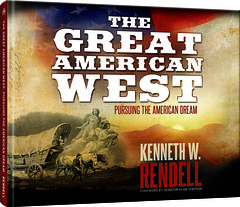
PREV ARTICLE
NEXT ARTICLE
FULL ISSUE
PREV FULL ISSUE
NEW BOOK: THE GREAT AMERICAN WEST
Dennis Tucker of Whitman Publishing forwarded this press release about a new book on the American West which features numismatic content.
-Editor
Rendell, a founding member of the Rittenhouse Society, has a long-standing connection to numismatics. “In the 1950s I traded my collection of English medieval coins to my friend Dave Bowers, for his collection of presidential letters,” Rendell said. “I immediately became enthralled by the feeling of intimacy with history that these letters gave me.” At the time Rendell was a specialist dealer in American colonial coinage, but this collection took him on a new path. His career since has focused on historical autographs, presidential memorabilia, royalty, militaria, politics, literature, and other collectible areas—including Western Americana. “The American Dream is fundamentally about hope, and historically it was always connected to the West,” says Rendell. “The hope was that a better life awaits your initiative, your perseverance, your cleverness, your hard work. It’s about making your own future.” The Great American West approaches the question, “Is the American Dream still alive?” In its collected narratives a reader can see the dream as it used to be—in early hand-drawn maps and adventure-promising posters, in letters sent home by lonesome gold miners, in newspaper clippings about famous explorers and frontier lawmen, in drawings and photographs from the Wild West. “Marveling at this rich and colorful past,” said Whitman publisher Dennis Tucker, “we can see where the American Dream is today.” Rendell’s numismatic background is well represented in the richly illustrated book. Among the treasures pictured and discussed inside:
All of these numismatic items (and more) are joined by hundreds of other artifacts including rifles and six-shooters, gunpowder horns and beaver hats, voyageur contracts, tomahawks, Indian headdresses, gold-mining claims, maps, drawings, railroad posters, and other iconic memorabilia that help us define the American West. “This book illustrates the daily life of those who have defined America,” wrote Senator Alan Simpson of Wyoming in the foreword. “It puts their letters in the reader’s hands, their lives in the reader’s mind, and their dreams in the reader’s heart.” Throughout the book, Rendell comments on the market for collectors and historians. For example, in chapter 2 (“The First Eastern Settlements”), he observes that “Collecting artifacts, manuscripts, and books from the period of the first Eastern settlements is less difficult than acquiring material from America’s early exploration, but the availability of such items is still very limited. Some early colonizers, such as William Penn, signed many land grants, but the material of others (for example, Roger Williams, the religious freedom leader who founded Rhode Island) is virtually unique in private ownership. John Smith’s books on Virginia and New England are very rare and expensive. Perhaps the least expensive artifacts are the coins of the British and French colonies; they offer a window into these early times for relatively modest sums.” # # # The Great American West: Pursuing the American Dream ∙ By Kenneth W. Rendell; foreword by Senator Alan Simpson ∙ ISBN 0794833594 ∙ Hardcover with dustjacket ∙ 11 x 9.5 inches ∙ Full color ∙ 224 pages ∙ Retail $29.95

Wayne Homren, Editor The Numismatic Bibliomania Society is a non-profit organization promoting numismatic literature. See our web site at coinbooks.org. To submit items for publication in The E-Sylum, write to the Editor at this address: whomren@gmail.com To subscribe go to: https://my.binhost.com/lists/listinfo/esylum All Rights Reserved. NBS Home Page Contact the NBS webmaster 
|
